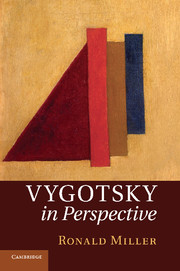2 - A thematic overview
Published online by Cambridge University Press: 21 April 2011
Summary
The largest body of commentary in the secondary Vygotsky English literature falls under the two very closely related headings of Cultural-Historical Activity Theory, or CHAT as it is more colloquially known, and Sociocultural Theory. Prominent proponents of each of these approaches are Cole and Wertsch who, in their own ways, have also been instrumental in bringing Vygotsky's work to the attention of English-speaking psychologists and other social scientists. Whatever their differences may be, common to both approaches is an emphasis on activity. Although not evident in Wertsch's label ‘sociocultural’, activity does take centre stage in the title of his book, Mind as Action, as well as in his main concepts of mediated action and cultural tools. Both these approaches are designed to go well beyond Vygotsky's theory and, in addition to their emphasis on activity, they also share in common the same perverse insistence that their own theoretical concepts are not only inspired or influenced by Vygotsky but are grounded in his cultural-historical theory that provides the source or foundation for their own ideas. For the sake of brevity, we can refer to these two approaches together as sociocultural activity theory.
In order to make the Vygotsky connection, the sociocultural activity literature paints a picture of Vygotsky like a portrait in profile that shows as much as it conceals. A distinctive stylistic feature of this literature is how it manages to blur fundamental issues that distinguish Vygotsky's views from those imputed to him in this literature.
- Type
- Chapter
- Information
- Vygotsky in Perspective , pp. 19 - 64Publisher: Cambridge University PressPrint publication year: 2011



